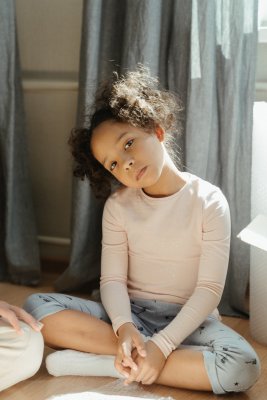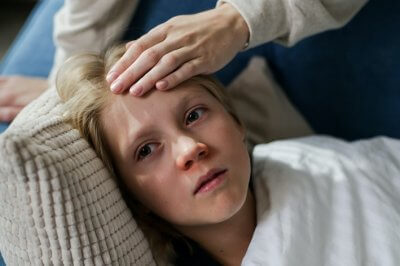Mental Health Issues in Children – Do You Know the Signs?
 by Andrea M. Darcy
by Andrea M. Darcy
Worried about your child or teen? And not sure how to recognise the signs of mental health issues in children?
Why is my kid not being themselves?
According to charity Young Minds, one in six children suffer from mental health issues here in the UK.
Being a kid can be hard. From navigating the rules of socialising, experiencing rejection and failure, and then entering adolescence and needing to form a solid identity and learn independence, challenges are par for the course. And periods of stress, anxiety, and sadness are a normal part of growing up.
So then how to know when it has veered from a normal issue to a mental health issue?
While knowing symptoms of main mental health issues in children is definitely important, your child is not a checklist. Each child has their own personality and way of dealing with stress. So it depends on your child’s personal baseline and if there are clear reasons for the changes in behaviour, or not.
Questions to ask about your child’s recent behaviours
So what key questions can you ask to recognise if your child is struggling?
1.Are they acting differently than usual?
Differences are really the key factor with recognising mental health challenges. For example, low moods is a classic sign of depression. But if your child has always been rather melancholy and quiet, suddenly being social and outspoken could be more a sign there was something wrong than if they were moody.
The NHS advises that behaviours to look out for in particular are:
- ongoing difficulty sleeping
- withdrawing from social situations
- not wanting to do things they usually like
- self-harm or neglecting themselves.
Other things to look for can include:
- sudden or very big emotional outbursts
- changes to self control, acting out more
- a new obsession with destruction or talking about death
- doing worse at school
- interacting differently with siblings.
2. Is there a cause for their behaviour, or not?

photo by: Mikhail Nilov
Being emotionally disturbed when upsetting things happen is a normal, healthy reaction.
If there is a cause you can pinpoint for the changes to your child’s behaviours and moods then it might be a normal stress response.
So if your child is acting differently after changing schools, being dropped by a social group, doing badly in their favourite class, or being rejected by a love interest? It’s time to help them manage. But not necessarily a sign they have issues.
3. How long has the change in behaviours been going on for?
Of course if your child has gone through something stressful, and the stressful issue has been resolved, but the changes to moods and/or behaviours are continuing? For several weeks or months? Then it might have evolved into anxiety, depression, or otherwise. Stress can indeed be a trigger for more serious issues.
4. Are they being secretive, avoidant, or not properly asking questions?
Sometimes we all need some privacy, even as children. We need time to think and process emotions or just be alone.
For teens in particular this can be perfectly normal behaviour. Teenagers are trying to figure out who they are, and this can form part of their attempt at autonomy. But if the refusal to talk is accompanied by anger or aggression, it could be a sign they are struggling.
As for young children, being secretive or shifty for longer than normal or in a way that is out of character can be a sign of shame following a difficult experience. It might be a red flag your child is not okay.
5. Are they practicing a lot of negative self talk?
Has your child started to say bad things about themselves? Put themselves down? Call themselves stupid?
This can be a learned behaviour. If they are in any way being criticised by, say, a new teacher or peer, they could be internalising the criticism. Or if you or another adult in your child’s life are very self-critical, they could be imitating you.
Otherwise, negative self-talk can be a sign your child has experienced something traumatic that has damaged their sense of self.
6. Is your child always happy and perfectly behaved?
Again, childhood presents challenges. It’s normal for a child to have periods of frustration and upset.
If a child is instead always calm, always happy, or always says they are ‘fine’, this might be more of a red flag than occasionally bursting into tears.
It might mean your child has trained themselves to hide their real feelings, which is a habit that can lead to problems with relating right into adulthood.
It can also be a sign that it’s time to troubleshoot or get support with your parenting. Sometimes, without realising it, we are not creating the safe space our child needs to feel they will gain unconditional love, support and acceptance regardless of their mood and behaviours. And they are falling into pleasing as a coping mechanism.
7. Are they constantly unwell?
 If a child feels they must please you all the time, and are not versed at being open about their feelings? They can manifest mental health issues through physical symptoms.
If a child feels they must please you all the time, and are not versed at being open about their feelings? They can manifest mental health issues through physical symptoms.
This can look like:
- sleep problems
- constant upset stomach
- headaches and fatigue
- unexplained medical symptoms
- ongoing colds and flu
- differences in appetite.
8. Are they very different to all their peers, such as socially and/or with learning development?
Sometimes the root of a child’s anxiety, depression, or esteem issues is because they are constantly dealing with the stress of being naturally different.
This can relate to diagnosable learning differences or behavioural disorders, such as attention deficit hyperactivity disorder (ADHD) and autism spectrum disorder.
Mental health issues in children
So what are the main mental health issues in children? They are the same as in adults. They include:
- ADHD
- anxiety and stress
- autism spectrum disorder
- depression
- learning differences
- low self-esteem
- eating disorders
- relating issues
- self-harm
- sleep problems.
[While listing symptoms of all these issues is beyond the scope of this article, note that each is a clickable link that leads to more information].
Is it all my fault my child has mental health issues?
This is an understandable and yet not a helpful perspective. First of all, it makes everything about you in a moment when the concern needs to be with your child and family. Secondly, it is making a complicated issue about blaming someone. Blame tends to be toxic, meaning we pull away from situations and relationships instead of moving in and healing them.
The best way to treat mental health issues in children
Obviously, showing your concern and support is crucial. Let your child know you are a safe space, and live up to that promise by learning about child mental health, supporting your child, and respecting their needs.
Of course children, like adults, can benefit from an unbiased space to share. And therapy can create this space for your child.
This is particularly important if the truth is that you are currently not able to be a safe space for your child, such as if you are dealing with too much stress yourself. This does not make you a bad person or parent. We are all human, and sometimes we just can’t manage.
Family therapy is often recommended. Children do not live alone or operate alone any more than we as adults do. We might think we are independent, but we are influenced by the environments we move through, and the relationships we invest in. The best way to approach mental health issues in children is as a family unit.
So does that mean as a parent I need therapy?
Individual therapy can certainly also be a useful tool when it comes to parenting. Any unresolved issues from your own past will manifest in all your relationships, including the way you approach parenting.
Again, this doesn’t mean you are a ‘bad’ parent. Parenting is not easy. There is no exact guide to raise a child, and most parents do the best they can with the knowledge and skills they have available. Therapists are not there to judge, they are there to understand and support you.
Time to help your child and family? We offer one of the mostly highly regarded teams of mental health experts in London, including child psychologists and family therapists.
Still have a question about mental health issues in children? Or want to share your experience with other parents? Ask below.
 Andrea M Darcy is a mental health and wellbeing expert and writer. With training in person-centred therapy and coaching, her favourite topics to discuss are childhood trauma, ADHD, and relationships. Follow her on Instagram for useful life tips @am_darcy
Andrea M Darcy is a mental health and wellbeing expert and writer. With training in person-centred therapy and coaching, her favourite topics to discuss are childhood trauma, ADHD, and relationships. Follow her on Instagram for useful life tips @am_darcy




